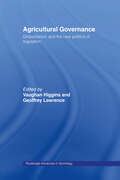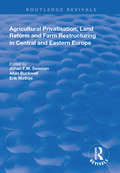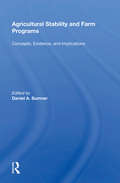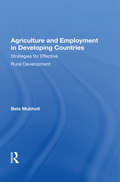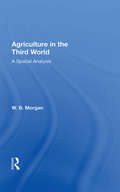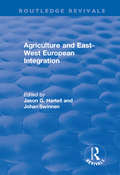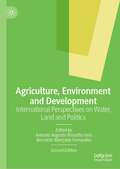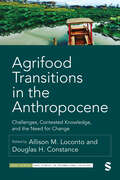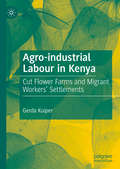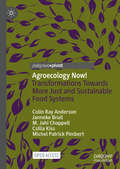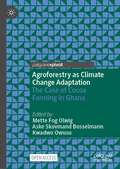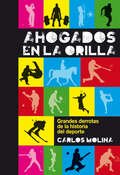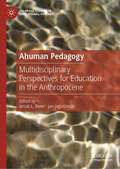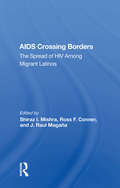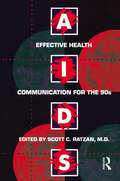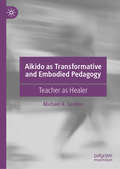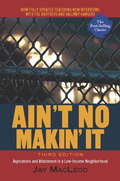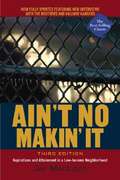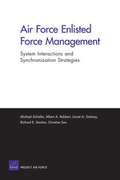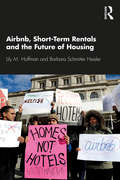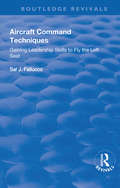- Table View
- List View
Agricultural Governance: Globalization and the New Politics of Regulation (Routledge Advances in Sociology)
by Geoffrey Lawrence Vaughan HigginsFood security and sustainability are arguably the most important issues facing the agri-food sector at the beginning of a new millennium. In an era of globalization, where nation states appear to have a diminishing role in governing these matters, the existing and emerging power relations underpinning agri-food regulation demand renewed scholarly attention. Drawing upon the expertise of some of the most prominent writers in rural sociology, geography and anthropology, this book shows how globalization processes open up a new regulatory politics in which ‘non-political’ forms of governing play an increasingly influential role in shaping agricultural production and consumption. The first of its kind to critically and comprehensively examine new forms of governing and regulation, this important text explores the relationship between globalization and new sites, spaces and agents of agricultural regulation, using detailed case studies in developed nations to illustrate points made. Demonstrating the political significance of regulatory mechanisms extending beyond the state, the book also discusses the consequences for the governing of the agri-food sector.
Agricultural Privatization, Land Reform and Farm Restructuring in Central and Eastern Europe (Routledge Revivals)
by Johan F.M. Swinnen Allan Buckwell Erik MathijsFirst published in 1997 in the wake of the fall of the Soviet Union and its agricultural policies, these editors presented a series of ten related articles on the transition to post-communist, more privatised agricultural policies, each specialising in a specific region of Central and Eastern Europe. Resulting from a research network, this volume features a range of contributors, including those preparing PhDs, former governmental advisors and specialists in agricultural economics, food policy and statistics. The chapters cover Albania, Bulgaria, the Czech Republic, Eastern Germany, Hungary, Romania, Slovakia, Solvenia, and the Former Soviet Union, along with a comparative analysis. The contributors focus on three key issues of reform: the collection of detailed data, the collection of information on factors influencing the progress and completion of reform and explaining the results of privatisation and land reform, with a particular emphasis on the first two elements. This volume is well-suited to policy makers, analysists and researchers.
Agricultural Stability And Farm Programs: Concepts, Evidence, And Implications
by Daniel A. SumnerThis book attempts to contribute to a fuller understanding of perennial issues underlying farm problems and agricultural policies in the United States thus contributing to better projections of policy effects, to better forecasts of policy changes, and perhaps to better policy for agriculture.
Agriculture And Employment In Developing Countries: Strategies For Effective Rural Development
by Bela B MukhotiHigh rates of growth in agricultural production need not be incompatible with increased employment, income, and the satisfaction of basic needs in the lower-income developing countries. Emphasizing this theme, the author presents three alternative agricultural development strategies and suggests guidelines for identifying appropriate policies and p
Agriculture In Third Wrl/h
by W. B. Morgan... we do not yet seem to have realised that the exchange of products between countries in one part of the world but at different stages of development is no less natural, and no less profitable for the various nations, than the exchange of products which differ because they grow in different climates' (Thiinen-Hall, xg66, p. 194). There have been few attempts to study agriculture within a spatial framework, notwithstanding the quintessential importance of land as a production factor. Land is most often treated as generalized environment although it could also be considered as social and economic space-social because even the most crowded of farming communities has much greater distance between its basic social units than exist within an urban-industrial agglomeration, and economic because distances to markets, to factor sources and to information must be overcome and frequently vary by type of market, factor and information source. Modem agricultural geography has been largely preoccupied with the development of techniques and with classification, often as ends in thexnselves, or with a geographical element consisting mainly of some general locational reference or regional description. Rarely has there been an attempt to identify a spatial structure associated with some particular agricultural enterprise* or practice.
Agriculture and East-west European Integration
by JASON G. HARTELL, JOHAN F.M. SWINNENThis title was first published in 2000: This volume analyzes key issues of the process of integrating Central and Eastern European countries with the European Union related to agriculture. The issues include the comparative advantage of CEEC agriculture and its development under various accession policy scenarios; the likely policy developments in both the CEECs and the EU, based on economic, social and political economy considerations; the expected economic impacts and adjustment costs for the agro-food sector under various policy outcomes; the most important constraints for integration including policy convergence issues and internal constraints; and how integration will potentially affect trade and labour flows in the Union. The country combines detailed country-specific and region-wide empirical and theoretical analysis.
Agriculture, Environment and Development: International Perspectives on Water, Land and Politics
by Antonio Augusto Rossotto Ioris Bernardo Mançano FernandesThe Second Edition of this book is completely revised and updated throughout providing an overview of current challenges faced within the area of Agri-food in relation to policymaking, ecological conservation and socio-environmental justice. Including a range of new chapters, the book explores some of the conceptual and analytical gaps that are presented by current approaches to this topic. The series of interconnected chapters offers a critical reinterpretation of the tensions associated with the failures of mainstream regulatory regimes, land and resource grabbing, and the impacts of global agri-food chains at local, regional and inter-sectoral scales. The book also examines past legacies and emerging challenges associated with agriculture modernisation, politico-spatial disputes, climate change, social movements, gender, ethnicity and education. It likewise addresses the transformative potential of different combinations of biophysical, socio-technical and socio-spatial practices of food sovereignty.
Agrifood Transitions in the Anthropocene: Challenges, Contested Knowledge, and the Need for Change (SAGE Studies in International Sociology)
by Douglas H. Constance Allison M. LocontoThe greatest challenges of the twenty-first century stem from the fact that we are now living in a new epoch: the Anthropocene. The human footprint on the planet can no longer be denied. One of the greatest and most essential human innovations, agriculture, is being increasingly recognised as a leading contributor to climate change. According to global governance bodies, the world will need to feed a predicted nine billion people by 2050. However, in this Anthropocene, we must address the environmental inequalities in how these people will be fed. This book explores our current societal struggles to transition towards more sustainable agrifood systems. It suggests that debates around sustainable agriculture must be social as well as technical, exploring the growth of social movements campaigning for more democratic food systems. However, as each chapter demonstrates, both the problems and the solutions in sustainable agriculture are highly contested. Using the term ′agrifood′ to capture the nexus between research, governance and the environment knowledge-environment-governance, this book provides an in-depth and wide-ranging account of current research around agricultural production and food consumption. The book introduces the Anthropocene along with the fundamental question that it poses about human-nature interactions. It outlines the core concerns related to agriculture and food and the debates around the need for agrifood system transitions. Each chapter investigates controversies in the field through case studies. These contributions offer a call for sociologists of agriculture and food to engage with the controversies unfolding in the Anthropocene.
Agrifood Transitions in the Anthropocene: Challenges, Contested Knowledge, and the Need for Change (SAGE Studies in International Sociology)
by Douglas H. Constance Allison M. LocontoThe greatest challenges of the twenty-first century stem from the fact that we are now living in a new epoch: the Anthropocene. The human footprint on the planet can no longer be denied. One of the greatest and most essential human innovations, agriculture, is being increasingly recognised as a leading contributor to climate change. According to global governance bodies, the world will need to feed a predicted nine billion people by 2050. However, in this Anthropocene, we must address the environmental inequalities in how these people will be fed. This book explores our current societal struggles to transition towards more sustainable agrifood systems. It suggests that debates around sustainable agriculture must be social as well as technical, exploring the growth of social movements campaigning for more democratic food systems. However, as each chapter demonstrates, both the problems and the solutions in sustainable agriculture are highly contested. Using the term ′agrifood′ to capture the nexus between research, governance and the environment knowledge-environment-governance, this book provides an in-depth and wide-ranging account of current research around agricultural production and food consumption. The book introduces the Anthropocene along with the fundamental question that it poses about human-nature interactions. It outlines the core concerns related to agriculture and food and the debates around the need for agrifood system transitions. Each chapter investigates controversies in the field through case studies. These contributions offer a call for sociologists of agriculture and food to engage with the controversies unfolding in the Anthropocene.
Agro-industrial Labour in Kenya: Cut Flower Farms and Migrant Workers’ Settlements
by Gerda KuiperThis ethnography analyses labour relations within the export-oriented cut flower industry at Lake Naivasha in Kenya. Though this agro-industry has attracted critical attention from journalists and non-governmental organizations, this book is the first comprehensive, social scientific analysis of the industry’s labour arrangements and production processes. Gerda Kuiper here interprets the work on the farms as ‘agro-industrial labour’: a labour system characterized by high levels of discipline and a strict rhythm of work, due to the demands posed by a highly perishable agricultural product. This framework enables the author to draw on insights from a wide range of anthropological and sociological studies on (agro-)industrial wage labour around the globe. This mixed-methods approach, deployed alongside rich ethnographic detail, allows the author to center the flower farm workers in her analysis.
Agroecology Now!: Transformations Towards More Just and Sustainable Food Systems
by M. Jahi Chappell Colin Ray Anderson Janneke Bruil Csilla Kiss Michel Patrick PimbertThis open access book develops a framework for advancing agroecology transformations focusing on power, politics and governance. It explores the potential of agroecology as a sustainable and socially just alternative to today’s dominant food regime. Agroecology is an ecological approach to farming that addresses climate change and biodiversity loss while contributing to the Sustainable Development Goals. Agroecology transformations represent a challenge to the power of corporations in controlling food system and a rejection of the industrial food systems that are at the root of many social and ecological ills. In this book the authors analyse the conditions that enable and disable agroecology’s potential and present six ‘domains of transformation’ where it comes into conflict with the dominant food system. They argue that food sovereignty, community-self organization and a shift to bottom-up governance are critical for the transformation to a socially just and ecologically viable food system. This book will be a valuable resource to researchers, students, policy makers and professionals across multidisciplinary areas including in the fields of food politics, international development, sustainability and resilience.
Agroforestry as Climate Change Adaptation: The Case of Cocoa Farming in Ghana
by Mette Fog Olwig Aske Skovmand Bosselmann Kwadwo OwusuThis open access book provides multidisciplinary perspectives on the potential of agroforestry to mitigate the negative impacts of climate change on cocoa production. Against the backdrop of increasingly precarious farmer livelihoods, it focuses on cocoa-agroforestry in Ghana – the second largest producer of cocoa in the world. Taking the reader on a journey across experimental plots and on-farm studies, the book delivers a holistic understanding of cocoa-agroforestry. Chapters examine historical yield and climate interactions, the effects of heat and drought on cocoa plants and the role of differing shade trees on soil fertility, yields, pests and diseases. The book discusses the socioeconomics of shade tree management, including cost-benefits, tree rights and competition for natural resources emphasizing policy implications and recommendations.Taking a multidisciplinary approach to climate-agriculture interactions, the book provides an innovative understanding of agroforestry and perennial cropping systems that goes beyond the Ghanaian cocoa belt. It is of relevance to students, researchers, farmers, practitioners and policymakers working with agroforestry and climate change adaptation.This is an open access book.
Ahogados en la orilla: Grandes derrotas de la historia del deporte
by Carlos MolinaUn anecdotario de aquellos que se quedaron al borde de la gloria. A veces las derrotas son tan grandes que permanecen en la memoria más tiempo que las victorias. En la historia del fútbol todavía está presente el maracanazo, la imposible derrota de Brasil ante Uruguay (Mundial de 1950) en el estadio más grande del mundo, que provocó suicidios en todo el país. Muchos años después, en el otro extremo del planeta, otra extraordinaria derrota cambió la vida de Sudáfrica: los famosos All Blacks de Nueva Zelanda, los más poderosos jugadores de rugby del mundo, cayeron ante la anfitriona y sobre este grandioso fracaso se edificó el futuro de un país hasta ese momento dividido. En la mitología de los fracasos también está la recordada final de Berna entre la invencible Hungría de Puskas y una Alemania que empezó a forjar su leyenda sobre la ruina de los húngaros. Hay perdedores que están por encima de los triunfadores, como es el caso del ciclista francés Raymond Poulidor, que si hubiera ganado el tour de Francia no sería tan famoso y querido como lo es habiendo sido tres veces segundo y cinco veces quinto. En este libro está Chuck Wepner, el boxeador que perdió ante el gran Muhammad Alí, pero su combatividad inspiró a Sylvester Stallone para imaginar a Rocky Balboa. Está el aciago hoyo 18 de Jean van de Velde, el jugador de golf más desgraciado de la historia. Está la impotencia del ajedrecista Korchnoi ante Karpov. Y también figura el atleta alemán Lutz Long, cuya derrota ante Jesse Owens humilló al mismísimo Hitler. Y tantos otros que se quedaron al borde de la gloria, ahogados en la orilla.
Ahuman Pedagogy: Multidisciplinary Perspectives for Education in the Anthropocene (Palgrave Studies in Educational Futures)
by Jan Jagodzinski Jessie L. BeierThis book brings together a collection of multi-disciplinary voices to discuss, debate, and devise a series of ahuman pedagogical proposals that aim to address the challenging ecological, political, social, economic, and aesthetic milieu within which education is situated today. Attending to contemporary calls to decenter all-too-human educational research and practice, while also coming to terms with the limits and inheritances through which such calls are made possible in the first place, this book aims to interrogate, but also invent, what we are calling an ahuman pedagogy. Organized in three main sections — Conjuring an Ahuman Pedagogy, Machinic Re/distributions, and Non-pedagogies for Unthought Futures — this multi-disciplinary experiment in ahuman pedagogies for the age of the Anthropocene offers an experimental – albeit always speculative and incomplete – series of pedagogical proposals that work to unthink and counter-actualize educational futures-as-usual.
Aids Crossing Borders: The Spread Of Hiv Among Migrant Latinos
by Ross F. Conner Shiraz I. Mishra J. Raul MagañaAIDS has crossed every international border and affects all populationsthroughout the world, including migrant workers. In the U.S.,migrant workers are a hidden and sometimes maligned population withlimited access to needed health and welfare services, including HIVprevention. Little, however, is krown about the impact of the HIV IAIDS epidemic oo Latino farmworkers. This absence of systematic researchwas the impetus for the preparation of this book.This book is the first collection of research studies focusing specificallym migrant Latino farmworkers. The book brings together sevenresearch studies to provide a profile of the HN prevention, surveillanceand treatment needs of migrant workers. The editors combinetheir own work with that of nationally and internationally recognizedexperts to provide a comprehensive analysis of different aspects of theHIV epidemic among migrant Latino workers. They examine issuessuch as the HN prevention needs of Latino farmworking women andtheir children, the sexual beliefs and behaviors of Latino migrantworkers, the effects of migration m changes in sexuality and sexualpractices, the risk for HN through use of sex workers, knowledge aboutthe HIV I AIDS epidemic, the effectiveness of prevention programs, andpolicies and programs that may stem the spread of HIV among thispopulation. The book is notable for including, in addition to researchers'views, the perspectives of migrant workers and policymakers mHN prevention policies and programs.
Aids: Effective Health Communicaton for the 90's
by Scott C. RatzanDespite educational efforts, the majority of Americans are still under the misconception that they are not at risk from HIV/AIDS infection. In addition, the federal government only spends 2% of the total designated federal AIDS funding toward prevention. Thus, information in respect to AIDS and health communication in any comprehensive nature is almost nonexistent.; This book aims to rectify the situation by presenting detailed analysis and actions necessary to confront the AIDS pandemic on every level of the communication realm. Contributors are experienced researchers, educators, government officials, and physicians. They examine the issue from a number of standpoints, including: communication, adolescent medicine, public administration, psychology, journalism, audiology, speech and language pathology, neurological surgery, preventive medicine and public health.
Aikido as Transformative and Embodied Pedagogy: Teacher as Healer
by Michael A. GordonDrawing on the author’s lifelong practice in the non-competitive and defensive Japanese art of Aikido, this book examines education as self-cultivation, from a Japanese philosophy (e.g. Buddhist) perspective. Contemplative practices, such as secular mindfulness meditation, are being increasingly integrated into pedagogical settings to enhance social and emotional learning and well-being and to address stress-induced overwhelm due to increased pressures on the education system and its constituents. The chapters in this book explore the various ways, through the lens of this non-violent relational art of Aikido, that pedagogy is always something being practiced (on the level of psychological, somatic and emotional registers) and thus holding potential for transformation into being more relational, ecological-minded, and reflecting more ‘embodied attunement.’ Positioning education as a practice, one of self-discovery, the author argues that one can approach personal development as engaging in a spiritual process of integrating mind and body towards full presence of being and existence.
Aiming for Pensacola: Fugitive Slaves on the Atlantic and Southern Frontiers
by Matthew J. ClavinIn the decades before the Civil War, the small number of slaves who managed to escape bondage almost always made their way northward along the secret routes and safe havens known as the Underground Railroad. Offering a new perspective on this standard narrative, Matthew Clavin recovers the story of fugitive slaves who sought freedom by―paradoxically―sojourning deeper into the American South toward an unlikely destination: the small seaport of Pensacola, Florida.<P><P> Geographically and culturally, across decades of rule by a succession of powers―Spain, Great Britain, and the United States―Pensacola occupied an isolated position on the margins of antebellum Southern society. Yet as neighboring Gulf Coast seaports like New Orleans experienced rapid population growth and economic development based on racial slavery, Pensacola became known for something else: as an enclave of diverse, free peoples of European, African, and Native American descent.
Ain't No Makin' It
by Jay MacleodThis classic text addresses one of the most important issues in modern social theory and policy: how social inequality is reproduced from one generation to the next. With the original 1987 publication of Ain't No Makin' It Jay MacLeod brought us to the Clarendon Heights housing project where we met the "Brothers" and the "Hallway Hangers." Their story of poverty, race, and defeatism moved readers and challenged ethnic stereotypes. MacLeod's return eight years later, and the resulting 1995 revision, revealed little improvement in the lives of these men as they struggled in the labor market and crime-ridden underground economy. The third edition of this classic ethnography of social reproduction brings the story of inequality and social mobility into today's dialogue. Now fully updated with thirteen new interviews from the original Hallway Hangers and Brothers, as well as new theoretical analysis and comparison to the original conclusions, Ain't No Makin' It remains an admired and invaluable text. Contents Part One: The Hallway Hangers and the Brothers as Teenagers 1. Social Immobility in the Land of Opportunity 2. Social Reproduction in Theoretical Perspective 3. Teenagers in Clarendon Heights: The Hallway Hangers and the Brothers 4. The Influence of the Family 5. The World of Work: Aspirations of the Hangers and Brothers 6. School: Preparing for the Competition 7. Leveled Aspirations: Social Reproduction Takes Its Toll 8. Reproduction Theory Reconsidered Part Two: Eight Years Later: Low Income, Low Outcome 9. The Hallway Hangers: Dealing in Despair 10. The Brothers: Dreams Deferred 11. Conclusion: Outclassed and Outcast(e) Part Three: Ain't No Makin' It? 12. The Hallway Hangers: Fighting for a Foothold at Forty 13. The Brothers: Barely Making It 14. Making Sense of the Stories, by Katherine McClelland and David Karen
Ain't No Makin' It
by MacleodAuthor Jay MacLeod OCOs classic ethnographyOCoa defining work on the cycle of social reproduction and inequality as lived through the young men from the Clarendon Heights housing projectOConow includes a third section that continues the lives of the original Brothers and Hallway Hangers through new interviews and analysis.
Ain't No Makin' It: Aspirations and Attainment in a Low-income Neighborhood
by Jay MacleodThis classic text addresses one of the most important issues in modern social theory and policy: how social inequality is reproduced from one generation to the next.
Air Force Enlisted Force Management
by Albert A. Robbert Richard E. Stanton Christine San Lionel A. Galway Michael SchieferA fundamental goal of the Air Force personnel system is to ensure that the manpower inventory, by Air Force specialty code and grade, matches requirements. However, there are structural obstacles that impede achieving this goal. To remove one of those obstacles, the authors propose a methodology that would marginally modify grade authorizations within skill levels to make it possible to better achieve manpower targets.
Airbnb, Short-Term Rentals and the Future of Housing
by Lily M. Hoffman Barbara Schmitter HeislerHow do Airbnb and short-term rentals affect housing and communities? Locating the origins and success of Airbnb in the conditions wrought by the 2008 financial crisis, the authors bring together a diverse body of literature and construct case studies of cities in the US, Australia and Germany to examine the struggles of local authorities to protect their housing and neighborhoods from the increasing professionalization and commercialization of Airbnb. The book argues that the most disruptive impact of Airbnb and short-term rentals has been on housing and neighborhoods in urban centers where housing markets are stressed. Despite its claims, Airbnb has revealed itself as platform capitalism, incentivizing speculation in residential housing. At the heart of this trajectory is its business model and control over access to data. In a first narrative, the authors discuss how Airbnb has institutionalized short-term rentals, consequently removing long-term rentals, contributing to rising rents and changing neighborhood milieus as visitors replace long-term residents. In a second narrative the authors trace the transformation of short-term rentals into a multibillion-dollar hybrid real estate sector promoting a variety of flexible tenure models. While these models provide more options for owners and investors, they have the potential to undermine housing security and exacerbate housing inequality. While the overall effects have been similar across countries and cities, depending on housing systems, local response has varied from less restrictive in Australia to increasingly restrictive in the United States and most restrictive in Germany. Although Airbnb has made some concessions, it has not given any city the data needed to efficiently enforce regulations, making for costly externalities. Written in a clear and direct style, this volume will appeal to students and scholars in Urban Studies, Urban Planning, Housing and Tourism Studies.
Aircraft Command Techniques: Gaining Leadership Skills to Fly the Left Seat (Routledge Revivals)
by Sal J FalluccoThis title was first published in 2002: A comprehensive examination of the characteristics of the experienced captain. Each chapter begins with an appropriate and relevant anecdote that is analogous to the chapter's main theme. It then progresses to the chapter's main objective and finishes with a scenario that the reader must try to solve from a captain's perspective. Immediately following each of these scenarios, the reader is presented with a number of considerations that should be evaluated when solving the problem. The intent is to help the pilot practice thinking as a captain. Offering a wealth of practical guidance, this book is an ideal platform for pilots or indeed, anyone interested in how leadership and management skills are used to achieve excellence. The reader should gain important command skills and learn how to apply these skills to routine and unexpected situations, in the same way in which an experienced captain would.
Airport Urbanism: Infrastructure and Mobility in Asia
by Max HirshThirty years ago, few residents of Asian cities had ever been on a plane, much less outside their home countries. Today, flying, and flying abroad, is commonplace. How has this leap in cross-border mobility affected the design and use of such cities? And how is it accelerating broader socioeconomic and political changes in Asian societies? In Airport Urbanism, Max Hirsh undertakes an unprecedented study of airport infrastructure in five Asian cities—Bangkok, Hong Kong, Shenzhen, Kuala Lumpur, and Singapore. Through this lens he examines the exponential increase in international air traffic and its implications for the planning and design of the contemporary city. By investigating the low-cost, informal, and transborder transport systems used by new members of the flying public—such as migrant workers, retirees, and Asia&’s emerging middle class—he uncovers an architecture of incipient global mobility that has been inconspicuously inserted into places not typically associated with the infrastructure of international air travel. Drawing on material gathered in restricted zones of airports and border control facilities, Hirsh provides a fascinating, up-close view of the mechanics of cross-border mobility. Moreover, his personal experience of growing up and living on three continents inflects his analyses with unique insight into the practicalities of international migration and into the mindset of people on the move.
